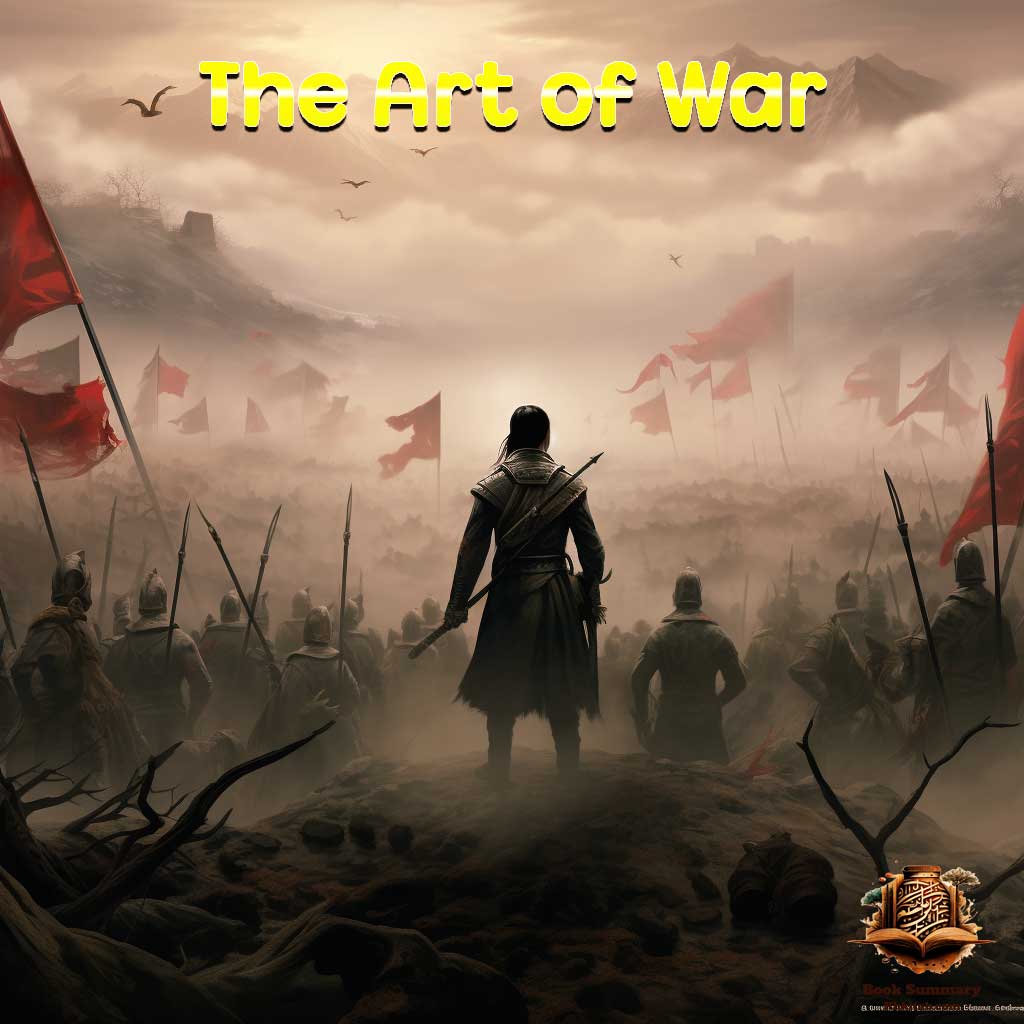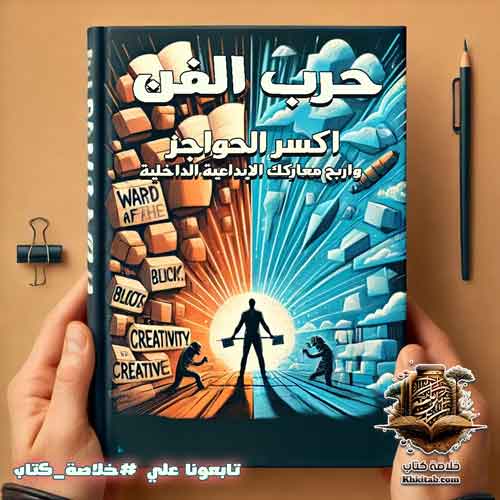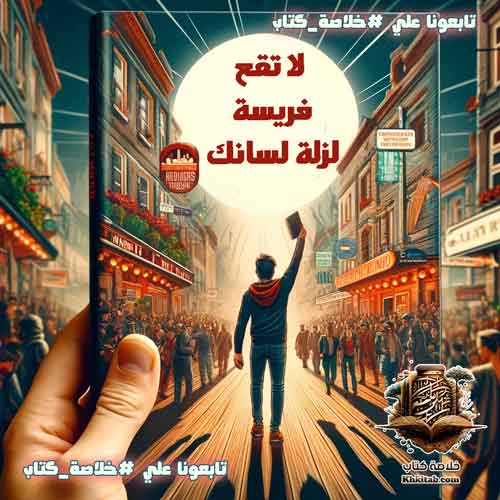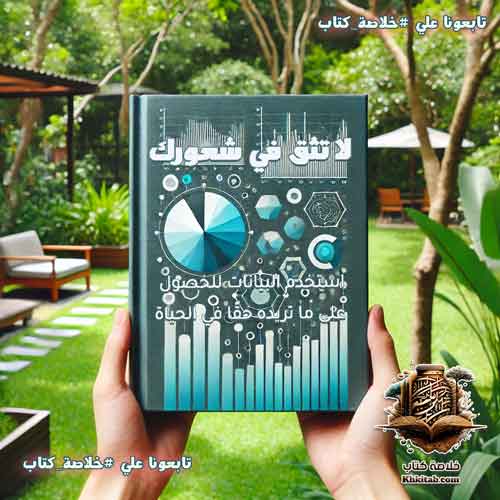Everything is F*cked: A Book About Hope Book Summary
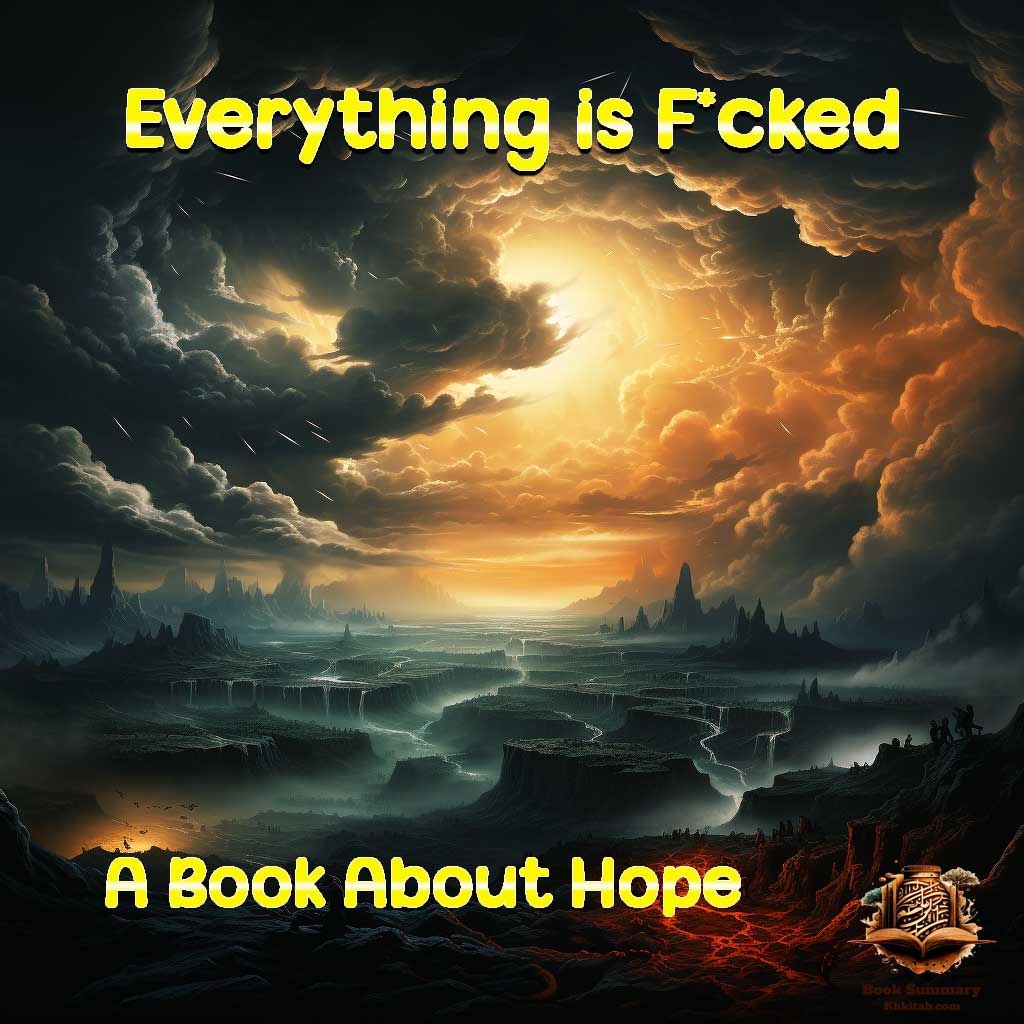
In “Everything is F*cked: A Book About Hope,” Mark Manson delves deep into the human psyche to explore the challenges of our contemporary era. The author embarks on a philosophical journey, pondering how we can find hope and meaning in a world that often appears fractured and chaotic.
The book touches on pivotal topics, such as the distinction between the “Thinking Brain” and the “Feeling Brain,” illustrating how the former plays a significant role in defining our values and objectives, while the latter frequently governs our day-to-day actions and decisions. Manson also emphasizes the concept of hope as a fundamental element of human existence, scrutinizing how the sources of our hope can either be constructive or detrimental.
“Everything is F*cked” is not just a guide to positive thinking. Instead, it’s a profound exploration of the concepts and ideas that govern our lives. Manson presents a balanced yet disillusioning perspective on humanity, offering in return a vision of how to live better by gaining a deeper understanding of our flaws and potential.
إقرأ أيضا:تسخير قوة العقل الباطن: استراتيجيات فعّالة لتحقيق النجاحIn an age where despair and disruption seem to be on the rise, “Everything is F*cked: A Book About Hope” stands as a sincere attempt to understand the circumstances we navigate and how we might find hope and meaning amidst the tumult. It is a book that challenges fundamentals, inviting readers to reassess the values and beliefs they have taken for granted.
How Does the Dichotomy of Our “Two Brains” Influence Decision Making in Mark Manson’s “Everything is F*cked: A Book About Hope”?
Mark Manson’s “Everything is F*cked: A Book About Hope” is a seminal work that dives deep into the intricacies of human psychology, societal norms, and our endless pursuit of hope in a seemingly chaotic world. One of the most enlightening topics he touches upon is the concept of the “Two Brains.”
Manson masterfully dissects the human psyche into two distinct entities: the “Thinking Brain” and the “Feeling Brain.” The “Thinking Brain” is our center for logic, reason, and analytical thought. It’s the part of our mind that tries to make sense of the world, rationalizes our experiences, and plans for the future. Whether it’s making career choices, planning financial investments, or understanding complex problems, the Thinking Brain is at the forefront.
On the other hand, the “Feeling Brain” is driven by emotion, impulse, and immediate gratification. It operates based on how we feel in the moment and is often responsible for our most visceral reactions. Think of the times you’ve made a choice purely because “it felt right” or when you acted on a gut feeling. That’s the Feeling Brain taking the reins.
However, Manson points out that it’s not as simple as one brain being superior to the other. Instead, he posits that our decision-making processes are a constant dance between these two entities. While we’d like to believe that our rational “Thinking Brain” is always in control, more often than not, it’s our “Feeling Brain” that initiates a decision, with the “Thinking Brain” coming in after the fact to rationalize or make sense of that decision.
In the modern world, where we are bombarded with information, stimuli, and endless choices, understanding the dynamics between these “Two Brains” becomes paramount. By recognizing which brain is dominating at any given time, we can better assess our decisions, be more conscious of our actions, and navigate the complexities of life with a clearer perspective.
In conclusion, Manson’s exploration of the “Two Brains” in “Everything is F*cked: A Book About Hope” offers readers profound insights into the duality of human nature. By understanding the intricate interplay between logic and emotion, readers are equipped with tools to make more informed, balanced, and, ultimately, hopeful decisions in their lives.
Our Facebook Page -Book Summary
How Does “Everything is F*cked: A Book About Hope” Illuminate the Dual Role of Hope and Despair in Shaping Human Consciousness?
In Mark Manson’s compelling narrative, “Everything is F*cked: A Book About Hope”, he dives into a central theme that resonates deeply with contemporary readers: the intertwined roles of hope and despair in our lives. Manson’s exploration is not just a casual discourse but a profound dissection of how these two emotions influence, drive, and sometimes manipulate our psyche.
At the core of Manson’s argument is the assertion that hope acts as a double-edged sword. On one hand, hope fuels our aspirations, motivates our actions, and offers solace in challenging times. It’s the beacon that often guides us through our darkest nights, inspiring perseverance and resilience. Without hope, it’s arguable whether humanity would have progressed, innovated, and overcome countless obstacles throughout history.
However, Manson also delves into the darker side of hope. In a world saturated with information and ever-evolving standards of success and happiness, where does genuine hope end and illusionary hope begin? He postulates that when hope is rooted in external validations, materialistic ambitions, or unrealistic standards, it can become detrimental. Such misdirected hope can not only lead to perpetual cycles of despair but also impede genuine contentment and self-awareness.
Furthermore, the sources of our hope play a pivotal role. Constructive sources, such as personal growth, genuine relationships, and purposeful endeavors, fortify our mental well-being. In contrast, sources rooted in superficial standards, fleeting pleasures, or societal pressures can prove to be harmful in the long run.
In essence, “Everything is F*cked: A Book About Hope” serves as a reflective mirror, urging readers to discern the nature of their hopes and the shadows of despair that might lurk beneath. By understanding this delicate balance and being mindful of where our hope stems from, we can pave a more enlightened, fulfilling path forward.
Philosophy and Sociology – Book Summary (khkitab.com)
How Does “Everything is F*cked: A Book About Hope” Navigate the Intricate Landscape of Human Values and Their Impact on Our Lives?
Mark Manson’s insightful narrative, “Everything is F*cked: A Book About Hope,” not only delves into human emotions and behaviors but also sheds light on the foundational role of values in shaping our lives. Through an in-depth exploration, Manson unravels the intricacies of our guiding principles and how they propel us forward or hold us back.
In his discourse, Manson posits that values are the anchors of our existence. They serve as the compass points that guide our decisions, behaviors, and overall worldview. Yet, not all values are created equal. While some uplift and drive us towards meaningful and fulfilling lives, others can lead to unending cycles of despair, discontent, and disillusionment.
Manson meticulously examines the qualities of good versus bad values. Good values, as he suggests, are reality-based, socially constructive, and immediate and controllable. Examples include honesty, innovation, vulnerability, and empathy. Such values foster growth, understanding, and authentic connections with others. In contrast, bad values, which can be based on external validation or be too reliant on outside factors, often lead to feelings of inadequacy and perpetual dissatisfaction. Seeking validation purely from material success, excessive attention, or superficial standards, are just a few examples.
Furthermore, Manson illuminates how societal pressures and the age of digital interconnectedness have drastically affected our value systems. With constant bombardment from social media and the ceaseless chase of perceived success, it’s easier than ever to adopt detrimental values. Yet, recognizing and recalibrating our values is pivotal. By anchoring ourselves in values that are genuine, reality-based, and intrinsically rewarding, we can navigate life with more clarity, purpose, and hope.
In conclusion, “Everything is F*cked: A Book About Hope” serves as a transformative guide, pushing readers to introspect, challenge, and redefine the values that shape their lives. Through understanding and refining our guiding principles, we can carve out a path that is not just hopeful, but also meaningful and rewarding.
How Does “Everything is F*cked: A Book About Hope” Decode the Significance of Pain and Suffering in Personal Growth?
“Everything is F*cked: A Book About Hope” by Mark Manson offers a fresh and introspective take on the human experience, especially when it comes to navigating the rough terrains of pain and suffering. But what makes Manson’s perspective unique, and why has it resonated with so many readers globally?
Manson emphasizes the inevitability of pain in life. Contrary to the popular pursuit of ceaseless happiness, he posits that life, by its very nature, is punctuated by bouts of pain and discomfort. However, rather than viewing these experiences as mere setbacks, Manson encourages readers to embrace them as integral components of personal growth.
Throughout the book, Manson deftly illustrates how pain, though universally shunned, holds transformative potential. It is through confronting our deepest fears, enduring our most profound sufferings, and facing life’s harshest realities that we can truly evolve. Such experiences, while undeniably challenging, serve as catalysts for introspection, resilience building, and the development of genuine empathy.
Furthermore, deriving meaning from suffering is central to Manson’s narrative. Instead of succumbing to despair or adopting a victim mentality, he encourages individuals to seek purpose within their pain. This might mean transforming personal tragedies into inspiring narratives of strength, leveraging painful lessons for future growth, or using personal challenges as a foundation to help others.
In essence, “Everything is F*cked: A Book About Hope” urges readers to reframe their perspective on pain and suffering. Instead of perceiving them as life’s cruel jests, Manson advocates for their recognition as invaluable teachers. By shifting our mindset and seeking the hidden lessons within our trials, we not only find hope in the darkest places but also forge a path toward profound personal evolution.
How Does “Everything is F*cked: A Book About Hope” Elaborate on the Concept of Antifragility in Shaping Human Resilience?
Mark Manson, in his gripping work “Everything is F*cked: A Book About Hope,” delves into a fascinating concept inspired by Nassim Nicholas Taleb’s groundbreaking ideas: antifragility. At the intersection of philosophy, psychology, and personal growth, how does Manson articulate the role of antifragility in human development and resilience?
Antifragility, as Taleb introduced, goes beyond mere resilience or robustness. While resilient entities resist shocks and remain unchanged, antifragile ones improve and grow stronger because of them. Manson applies this perspective to the human spirit, suggesting that challenges, adversities, and the disorderly tapestry of life are not merely hurdles but transformative catalysts.
In Manson’s exploration, he asserts that individuals can, and often do, benefit from the chaos and challenges life throws their way. Whether it’s personal trauma, societal upheavals, or any form of distress, these experiences, when approached with the right mindset, can act as refining fires, molding individuals into more potent and evolved versions of themselves.
Moreover, Manson emphasizes the significance of embracing challenges instead of shying away from them. In a culture often obsessed with the elimination of discomfort and the constant pursuit of happiness, Manson’s perspective is refreshingly counter-intuitive. He suggests that seeking out experiences that challenge us, confronting our vulnerabilities, and engaging in the uncomfortable can lead to unprecedented personal growth.
In essence, “Everything is F*cked: A Book About Hope” champions the idea that adversity isn’t something to be merely endured, but an opportunity to be leveraged. By harnessing the power of antifragility, individuals can transform life’s challenges into stepping stones, forging a path of growth, strength, and, ultimately, hope.
How Does “Everything is F*cked: A Book About Hope” Illuminate the Interplay Between Existentialism and Absurdism in the Quest for Meaning?
In “Everything is F*cked: A Book About Hope,” Mark Manson embarks on a profound exploration of human existence, intertwining existentialist and absurdist philosophies to shed light on our never-ending search for meaning. But what insights does he offer on grappling with the apparent indifference of the universe and our place within it?
Manson introduces readers to the core tenets of existentialism, emphasizing the inherent freedom individuals possess to create their own essence. Life, as existentialists argue, doesn’t come with a predefined purpose; instead, it’s up to each individual to determine their own path and make sense of their existence. This freedom, while liberating, also comes with the weight of responsibility and the existential angst born from understanding that each choice crafts the essence of one’s being.
However, Manson doesn’t stop at existentialism. He delves deeper into the realm of absurdism, inspired by the works of thinkers like Albert Camus. Absurdism posits that while humans incessantly seek meaning, the universe remains coldly indifferent to such quests. This creates an inherent tension or “absurdity” between our need for purpose and the universe’s lack of response.
Manson highlights that, in the face of such absurdity, there are a few potential responses. One can opt for denial, embracing illusory beliefs to mask the void. Another might choose despair, becoming paralyzed by the apparent meaninglessness. Yet, there’s a third way, one that Manson advocates for: confrontation. By embracing the absurdity of existence, one can live authentically, passionately, and, paradoxically, find a subjective sense of meaning within the meaninglessness.
In sum, “Everything is F*cked: A Book About Hope” serves as a philosophical compass, guiding readers through the dense forests of existential thought and the vast deserts of absurdity. By grappling with these profound ideas, Manson offers a fresh perspective on how to navigate the challenges of existence, encouraging readers to confront the absurd head-on and find hope amidst the chaos.
How Does “Everything is F*cked: A Book About Hope” Address the Existential Crises Stemming from Modern Comforts and Technological Advancements?
In “Everything is F*cked: A Book About Hope,” Mark Manson delves into a paradox of our age: while we have achieved unprecedented comforts through technological advancements, we find ourselves grappling with a new set of existential challenges, leaving many to question if we are truly better off.
Manson starts by highlighting the irony of our progress. As societies, we have successfully reduced many of the physical hardships that defined human existence for millennia. Diseases have been eradicated, hunger minimized in many parts of the world, and communication barriers obliterated. Yet, this progress has come with unexpected costs.
One of the central arguments Manson puts forth is the idea that our technologically-driven comforts might have inadvertently detached us from the foundational elements that once gave our lives meaning. For instance, in a world where our basic needs are often met without significant effort, where does one find purpose? The very technologies designed to connect us more effectively, from social media to instant messaging, might be driving feelings of isolation and inadequacy, as individuals are constantly bombarded with curated versions of others’ lives.
Moreover, with the wealth of information available at our fingertips, many are faced with the ‘paralysis of analysis.’ The overabundance of choices, from entertainment to career paths, while empowering, can also be a source of overwhelming anxiety. There’s a constant questioning if one is making the ‘right’ choices, leading to a perpetual state of FOMO (Fear of Missing Out).
Manson further notes that the security and predictability provided by our modern comforts might have stripped us of our ability to cope with genuine adversity when it does arise. In eras past, daily challenges and the fight for survival necessitated resilience and adaptability. Now, in the absence of such external challenges, many are left feeling unfulfilled or ill-equipped to handle life’s inevitable setbacks.
In conclusion, “Everything is F*cked: A Book About Hope” provides a compelling examination of the double-edged sword that is technological and societal progress. Manson offers a fresh perspective on the nuanced challenges of our age, emphasizing that while modern advancements have undoubtedly bettered our external lives in many ways, the internal, existential battles have merely evolved, requiring a new kind of introspection and understanding.
How Does “Everything is F*cked: A Book About Hope” Advocate for Embracing Responsibility as a Pathway to Empowerment and Meaning?
Mark Manson, in “Everything is F*cked: A Book About Hope,” underscores a transformative idea: embracing responsibility, even for situations beyond our immediate control, serves as a crucial conduit for empowerment and deriving profound meaning in life. But how does Manson elaborate on this, and why does he see it as a crucial pillar for individual growth and societal well-being?
Manson observes that in the modern age, there’s a prevalent tendency to shift blame, to deflect responsibility, and to play the victim. This phenomenon, while comforting in the short term, often leaves individuals feeling powerless and trapped in their circumstances. By constantly externalizing the source of one’s issues, the ability to affect change becomes limited, leading to stagnation and frustration.
Conversely, Manson posits that by accepting responsibility for our lives – and this includes the challenges, the setbacks, and even the unforeseen circumstances – we reclaim our power. This doesn’t mean we’re at fault for everything that happens to us; rather, it’s about understanding that our response to situations, our mindset, and our actions, are always within our control.
One of the fundamental tenets Manson presents is the idea that pain is inevitable but suffering is a choice. Challenges, setbacks, and hardships are inherent to the human experience. However, by taking responsibility for our reactions to these situations, we can transform pain into growth, adversity into learning, and challenges into opportunities.
Manson doesn’t just speak on an individual level. He extends this idea to societal and global challenges. When communities and nations adopt a mindset of responsibility, solutions to pressing issues become conceivable. It fosters a culture of proactiveness, where problems are met with collective resolve instead of blame and division.
In essence, “Everything is F*cked: A Book About Hope” champions the idea that responsibility is not a burden but a liberator. It’s a lens through which individuals can view their lives, not as a series of things that happen to them, but as a canvas on which they have the power to paint, shape, and define their journey. By embracing responsibility, we unlock the potential to craft a life imbued with purpose, agency, and hope.
How Has “Everything is F*cked: A Book About Hope” Explored the Dual Impact of Technology on Human Connection and Isolation?
In “Everything is F*cked: A Book About Hope,” Mark Manson delves deeply into the nuances of our relationship with technology, especially in the digital age. While technology, on one hand, promises connectivity, empowerment, and access, Manson paints a picture of its darker, often overlooked ramifications on our mental and emotional well-being.
Manson articulates a paradox that many of us might feel but find hard to express: despite being more ‘connected’ than ever, a significant number of people feel increasingly isolated. Platforms like social media, which were initially celebrated as tools for global connection, often become echo chambers where we’re only exposed to similar ideas and like-minded individuals. This, in turn, can lead to a distorted perception of reality and can exacerbate feelings of loneliness, as we continually measure our lives against the filtered highlights of others.
Another pivotal point Manson emphasizes is the instantaneous nature of the digital age. The constant barrage of notifications, news, and updates has led to an ever-decreasing attention span. This has a profound effect on our capacity for patience, deep thinking, and genuine human interaction. In a world where gratification is often just a click away, the value of persistence, waiting, and genuine effort can be overshadowed.
Moreover, the reliance on digital platforms for validation, through likes and comments, introduces a volatile foundation for self-worth. As Manson points out, grounding one’s self-esteem on such fleeting metrics can result in a roller-coaster of emotions, from euphoria to despair, based on external validation.
However, it’s also worth noting that Manson doesn’t condemn technology outright. Instead, he encourages a more mindful engagement with it. Recognizing its benefits while being acutely aware of its pitfalls is crucial. Technology, in Manson’s perspective, is a tool, and like any tool, its impact is determined by how we use it.
In conclusion, “Everything is F*cked: A Book About Hope” offers a profound exploration of technology’s double-edged sword in the modern era. Manson’s insights beckon readers to reflect on their digital habits, to find a balance that fosters genuine connection while mitigating feelings of isolation and despair. In a world increasingly mediated by screens, this call for introspection has never been more relevant.
How Does “Everything is F*cked: A Book About Hope” Navigate the Delicate Balance Between Religion’s Power to Provide Hope and Its Potential Misuse?
“Everything is F*cked: A Book About Hope” by Mark Manson delves profoundly into the intricate relationship humans share with religion and faith. Throughout history, religion has been a double-edged sword, offering solace and meaning on one side, but also being a tool for control and extremism on the other. How does Manson articulate this balance, and what insights does he provide?
Manson posits that, at its core, religion aims to offer answers to the existential questions that plague humanity. In a chaotic and often unpredictable world, religious beliefs can serve as an anchor, providing a sense of purpose, belonging, and understanding. For many, faith acts as a guiding light in dark times, offering a pathway to hope when all else seems bleak.
However, Manson also tackles the potential pitfalls of blind religious adherence. Religion, when misinterpreted or manipulated, can lead to dogma, intolerance, and even violence. He emphasizes that while faith can be a source of unparalleled strength and resilience, it becomes detrimental when it stifles critical thinking, curbs questioning, or promotes exclusion.
A notable point Manson underscores is the difference between personal faith and organized religion. Personal faith, he suggests, is an intimate, individual relationship with a higher power or a set of beliefs. It’s fluid, adaptable, and deeply personal. On the other hand, organized religion, being an institution, can sometimes be more about power dynamics and less about spiritual fulfillment.
Furthermore, Manson examines the role of religious leaders. While many are driven by a genuine desire to guide their followers towards enlightenment and salvation, there are those who misuse their influence, leading their adherents down paths of radicalism or blind obedience.
In summation, “Everything is F*cked: A Book About Hope” provides a nuanced exploration of the role of religion and faith in shaping human experience. Manson’s narrative serves as a reminder of the profound positive influence faith can have on individuals while cautioning against its potential misuse. The book beckons readers to approach faith with an open heart but also with an open mind, understanding the fine line between genuine spiritual connection and dogmatic adherence.
How Does “Everything is F*cked: A Book About Hope” Address the Emergence of Collective Movements in Times of Societal Disruption?
In “Everything is F*cked: A Book About Hope,” Mark Manson delves into the human psyche’s response to the tumultuous waves of societal changes. A significant portion of this response manifests in the rise of collective movements. These movements, as Manson portrays, are not just reactions to societal issues but are deeply rooted in the human desire for hope, meaning, and a sense of belonging.
Manson points out that in times of crisis or uncertainty, individuals gravitate towards ideologies or movements that promise stability, understanding, and most importantly, hope. These movements offer narratives that simplify complex issues, creating a shared ‘enemy’ or challenge that needs to be overcome. It gives a sense of purpose to its followers, binding them together in a shared mission.
However, there’s a nuanced observation that Manson brings forward. While collective movements can be a force for good, ushering in positive societal changes, they can also become dogmatic, exclusionary, or even violent. The very hope they promise can be turned into a weapon against those who do not conform or who challenge the prevailing narrative. It’s a delicate balance, and Manson stresses the importance of being aware of the underlying motives and being wary of movements that stifle individual thought in favor of collective ideologies.
He also emphasizes the role of leaders in shaping the direction of these movements. Charismatic leaders can harness the collective energy of their followers for transformative positive change. Conversely, they can also manipulate this energy for personal gain or for more nefarious ends.
In conclusion, “Everything is F*cked: A Book About Hope” offers a compelling exploration of the double-edged sword of collective movements. While they can be powerful agents of change and provide immense hope to their followers, Manson cautions against losing one’s individuality and critical thinking in the tide of collective fervor. As societies evolve and face new challenges, the dynamics of these movements will continue to play a pivotal role, and Manson’s insights serve as a guide to navigating these often turbulent waters.

